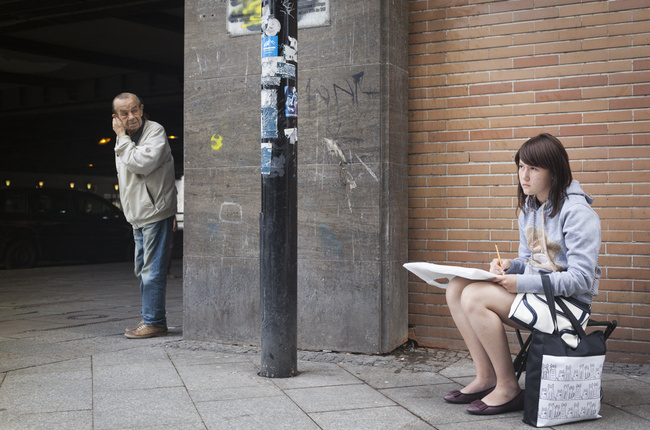Is street photography illegal in Germany?
To find out, Berlin-based street photographer Espen Eichhöfer has appealed a conviction that he invaded a woman’s privacy. The 528 supporters of his project on the Startnext crowdfunding platform want to find out too, so they gave him 18,075 € (roughly $19,850) for legal fees.
“I want to find out if street photography in an artistic context is legally secured in Germany,” Eichhöfer said on his crowdfunding page.
The ultimate goal is to obtain “a landmark decision in order to create a clear legal situation for all artists in the future.”
He started his crowdfunding campaign after one of his street photography subjects decided to sue him for publishing an image of her in an exhibition at C/O Berlin, alleging that the photo was a violation of her privacy rights.
The Law
The legal basis for her lawsuit comes from a law passed in 1907, which stated that if a photographer didn’t have the permission of the subject in a photograph, they weren’t allowed to publish the image.
Eichhöfer works for the Ostkreuz photo agency and has been taking street photos in Germany for the last 12 years. He’s a professional, but being photographed in public is part of modern day life, no matter if it’s a pro or an amateur with a smartphone.
“If you go out in public space, you must expect to be photographed. And it`s just a fact. People constantly use their smartphones – no one knows in which context those photos are used for,” he told Through the Cracks via email Thursday.
Privacy in Public
Privacy in public has always been a murky area for photographers, both inside and outside of Germany.
Ignoring opposition by groups like the Press Photographers Association and American Society of Media Photographers, the Arkansas state senate passed a bill that would have effectively made street photography illegal last week. A story on the subject went viral on Fstoppers.com.
The bill was later vetoed by Gov. Asa Hutchinson.
“In its current form, the bill unnecessarily restricts free expression and thus could have a chilling effect on freedom of speech and freedom of the press,” he said in a statement.
Time for an Answer?
Should a photograph captured in public be the property of the photographer or the subject? German photographers may soon have a clear, legal answer.
“Street photography is an art form that is almost as old as photography itself,” Espen said on his campaign page.
Eichhöfer spread the word about his crowdfunding campaign through his agency, emails, a photographers’ union, and the press.
The case has received attention from Berlin Morgenpost and the TV station Das Erste, and Eichhöfer wrote a story about it for Vice Germany.
If crowdfunding had not covered the cost, Eichhöfer said he would still seek an appeal, partly with his own money and the Ostkreuz photo agency.
The trial is currently under appeal by both parties.
Any money left over after the legal battle will go toward a symposium on street photography, Eichhöfer said.
Sandra Proudman (@SandraProudman) is a writer and photographer based in Northern California. She is a believer in the power of crowdfunding to move projects and people forward.
![]() Through the Cracks: Crowdfunding in Journalism, where this story first appeared, is a news website that shares stories of innovation, reporting and storytelling made possible by the crowd. We also share resources and advice from journalists who have carried out successful campaigns. We’re pretty excited about crowdfunding’s ability to bring untold stories to light and support media entrepreneurs and news startups. To keep up with the latest visit throughcracks.com, follow @crowdjournalism on Twitter and check out their Facebook page.
Through the Cracks: Crowdfunding in Journalism, where this story first appeared, is a news website that shares stories of innovation, reporting and storytelling made possible by the crowd. We also share resources and advice from journalists who have carried out successful campaigns. We’re pretty excited about crowdfunding’s ability to bring untold stories to light and support media entrepreneurs and news startups. To keep up with the latest visit throughcracks.com, follow @crowdjournalism on Twitter and check out their Facebook page.





The people pushing for the right to photograph people in the street need to think this ALL the way through. It needs to factor in what uses the photos will be put to…and it seems reasonable that if there is a commercial use that the person in the photo should be granted the right to consent to that use. Also, you need to consider cases where the “photographer” is the government or the police. Restrictions on the use of those photos might well be in order.